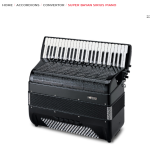I‘m pleased to see that the conversation has shifted somewhat to consider the accordion’s potential in playing soundtrack tunes and video game music. Many people enjoy and listen to soundtrack music at home while not actively following classical music. It can have a wide appeal. Often if I play the Amelie tunes friends comment how much they loved the accordion sound in the film. But I think the accordion can play other soundtrack music very well too.
I was also just thinking of TV dance programme Strictly Come Dancing, that adapts popular tunes to be suited for dancers to dance to competitively. Either the original programme in the UK or its many spin-offs worldwide. Accordions are regularly deployed in the UK programme’s live band for the tango based dances. But the music used isn’t always the more obvious traditional tango music. For example in the last series there was a marvellous tango dance version of Ed Sheeran’s recent pop tune Shivers. I’m preparing my own accordion arrangement of it now, and it’s a tune that really suits the squeezebox. And is a tune popular with many today.
P.S. I’m not averse to classical music myself. I played in an orchestra for a decade as a youngster, though violin not accordion! But I am aware that in many parts of the world it is more of a niche taste. And there is other music more widely popular.
I was also just thinking of TV dance programme Strictly Come Dancing, that adapts popular tunes to be suited for dancers to dance to competitively. Either the original programme in the UK or its many spin-offs worldwide. Accordions are regularly deployed in the UK programme’s live band for the tango based dances. But the music used isn’t always the more obvious traditional tango music. For example in the last series there was a marvellous tango dance version of Ed Sheeran’s recent pop tune Shivers. I’m preparing my own accordion arrangement of it now, and it’s a tune that really suits the squeezebox. And is a tune popular with many today.
P.S. I’m not averse to classical music myself. I played in an orchestra for a decade as a youngster, though violin not accordion! But I am aware that in many parts of the world it is more of a niche taste. And there is other music more widely popular.

